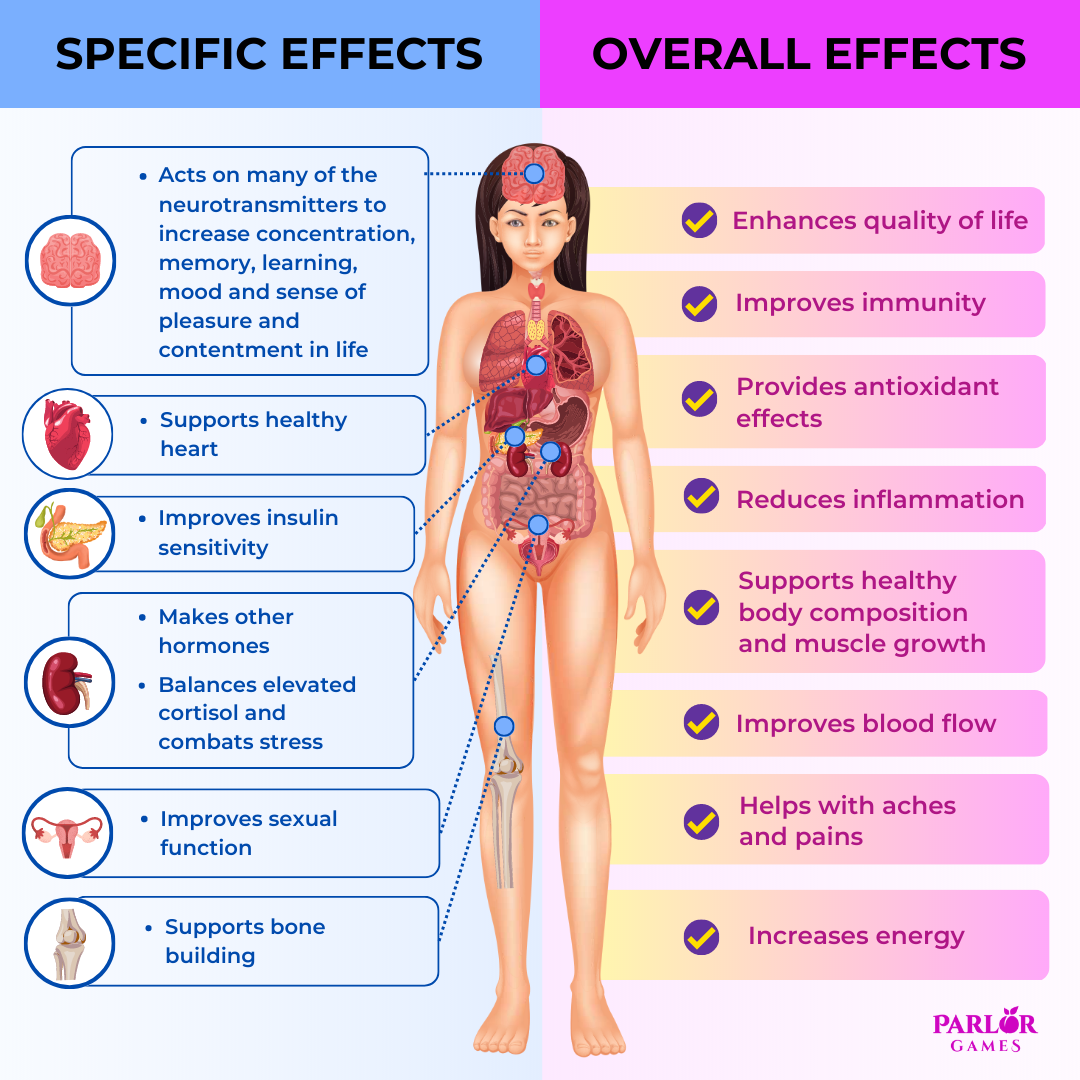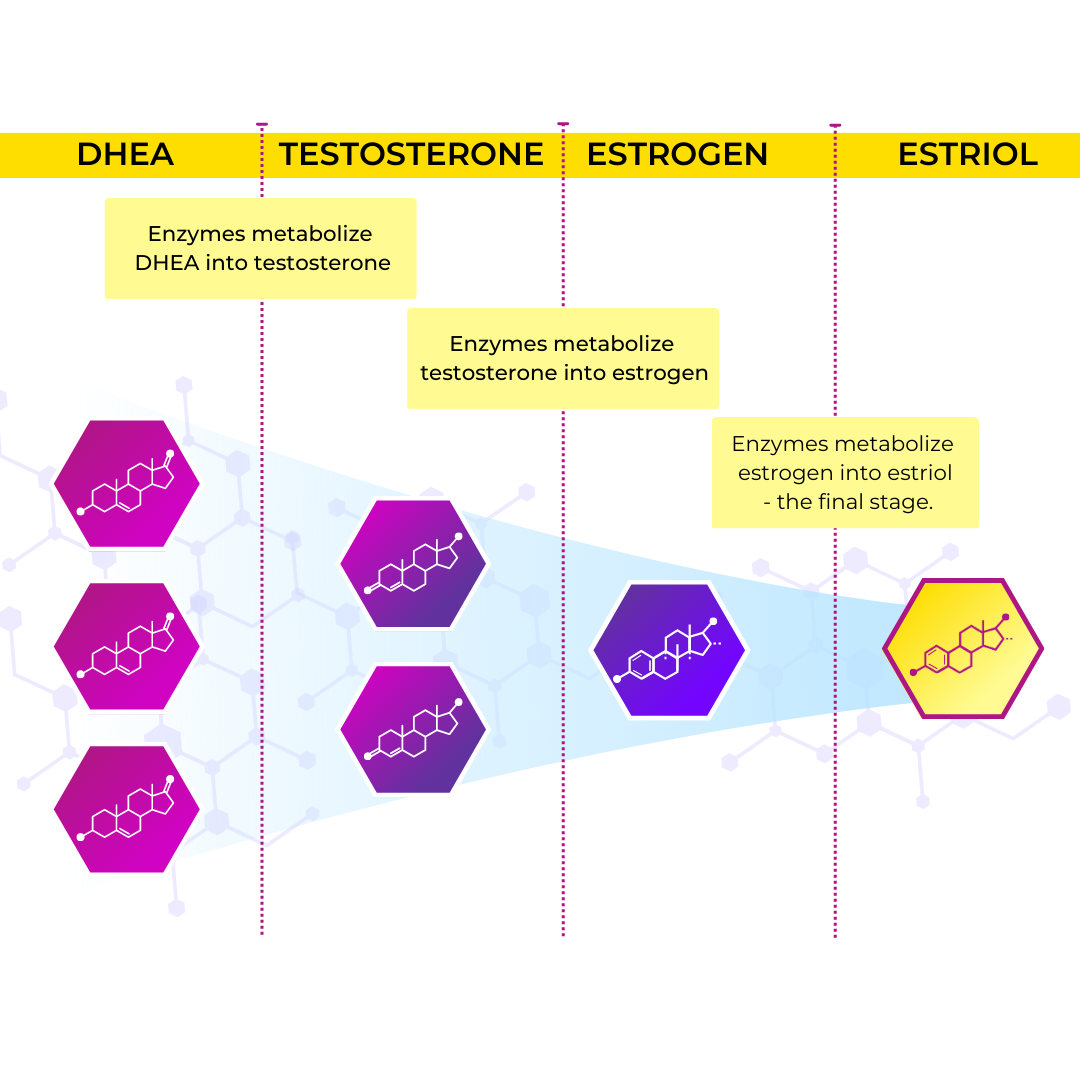LAST DAY TO SAVE 10%* - Coupon BFCM2024
*Excludes BioNude, subscriptions, hormone tests and health coaching

Dehydroepiandrosterone (DHEA) is a hormone produced by the ovaries and the adrenal glands that plays a crucial role in the body's hormone balance. DHEA levels decline as women and men age, and the decrease in DHEA production is associated with various age related symptoms. In this blog, we'll discuss DHEA use, how it works, what it does, and its benefits and risks.
What is DHEA?
Dehydroepiandrosterone (DHEA) is a steroid hormone produced by the ovaries and the adrenal glands, and it plays a vital role in the body's hormone balance. DHEA is a precursor hormone that can be converted into other hormones, such as estrogen and testosterone, which play essential roles in the body. Otherwise known as a prohormone, DHEA is the most abundant naturally occurring base for hormones in the body. Humans make more and more DHEA from birth to about age 25. People make the most DHEA during their prime reproductive years – optimum health, energy, mental sharpness – between the ages of 18 to 25. This is when humans are naturally most fit to have children, think clearly, and have the physical strength to best care for their offspring (read: to help them deal with the traumatic experience that is raising a toddler…). At around 30, DHEA levels begin to decline for the remainder of life at a rate of about 2% per year. By age 70 to 80 years, DHEA levels can be as low as 20% to 10% compared to younger individuals. Because DHEA is important for many functions in the body, its decline correlates with the steady decline in many functions in the body – those often associated with the aging process and the increase in disease states.
How Does DHEA Help Health After Menopause?
DHEA supplementation may help alleviate some age-related symptoms, including:

What are the Risks of DHEA Use?
DHEA can be used as we advance into our 60's and beyond. While DHEA supplementation may help alleviate some age-related symptoms, it's important to note that it's not without risks. Some potential risks of overuse of DHEA include:

This diagram shows DHEA in the system (either natural or added). The first conversion is to testosterone, the testosterone is then converted to estrogen, and finally, the estrogen is converted into estriol (where it remains). Because all of our bodies are unique, the enzymes that convert DHEA to testosterone (or testosterone to estrogen, and so on) will vary in amounts in each of us. This means if you have a lot of those enzymes, your body may rapidly convert DHEA into testosterone, or into estrogen. If you have less, it may take longer. This will affect your overall hormone balance and which hormone you 'hold on' to more of. It is also why everyone has a unique experience on DHEA.
Should You Use DHEA for Age Related Symptoms?
DHEA supplementation may help alleviate some age-related symptoms. Because some of the DHEA will be converted to other hormones, it it wise to consult with your healthcare provider to determine if it's appropriate for you, and to determine if 5mg of topical DHEA is appropriate for you. There are two key things to remember about DHEA supplementation:
DHEA is a hormone produced by the adrenal glands that plays a crucial role in the body's hormone balance. DHEA levels decline with age, and the decrease in DHEA production is associated with various age-related symptoms. DHEA supplementation may help alleviate some of these symptoms, including hot flashes, mood changes, sexual function, and bone density. However, DHEA use is not without risks and may increase the risk of hormone-related cancers, acne and hair loss, cardiovascular risks, hormone imbalance, and liver toxicity. Consult with your healthcare provider to determine if DHEA supplementation is appropriate for you, and to determine the appropriate dose.
To grab our amazing ReBounce DHEA cream, click here!

Lorem ipsum dolor sit amet, consectetur adipiscing elit.
Lorem ipsum dolor sit amet, consectetur adipiscing elit.
Lorem ipsum dolor sit amet, consectetur adipiscing elit.
Lorem ipsum dolor sit amet, consectetur adipiscing elit.
Disclaimer: The information provided above is intended for educational and informational purposes only. Statements made have not been evaluated by the FDA nor are they intended to treat or diagnose. Any health concerns should be discussed and evaluated by your primary health care provider.
Parlor Games, LLC ● kate@parlor-games.com ● 5304 River Rd N Ste B ● Keizer OR 97303
Disclaimer: The information provided above is intended for educational and informational purposes only. Statements made have not been evaluated by the FDA nor are they intended to treat or diagnose. Any health concerns should be discussed and evaluated by your primary health care provider.
28 Day Challenge Subscription Details

We ship you a 28 day supply of Silky Peach Cream for only $29 (more than 25% off our normal price) when you sign up for Subscribe & Save.
Follow the directions we include in the package and apply Silky Peach cream on your tender bits for 28 days.

Decision Day:
5 days before your subscription rebills, we’ll send you an email reminder with a link. If you decide Silky Peach is nice but not your thing… you can click that link and cancel your subscription without even talking to anyone. No hassle — no questions asked.
If you are like 72% of our Silky Peach customers, you’ll love it and can't imagine life without it. In that case, do nothing, and we’ll welcome you to the Parlor Games family and ship Silky Peach Cream to your door step every month for the same discounted price of $29 — locked in for as long as you remain a subscriber.

Important note about our easy-breezy subscriptions:
We know that some companies make it hard to cancel a subscription — that’s not us. Our mission is to save the world — one vagina at a time! If you decide you don’t need Estriol as an ongoing solution for dryness, incontinence, UTIs and keeping sex fun and comfortable again, we understand. Five days before we ship your next order, you'll receive an email with a link to cancel right there in the message.
No hunting, no searching, we got you. Respect is where it’s at.
FYI – Estriol is beneficial for skin integrity and mucous membranes. It’s great for vaginal atrophy and also amazing for use on the face and neck. Applying a small amount — about 1 pump — can help build the collagen and plump up the cells to reduce wrinkles. Who knew!!
OUR HAPPINESS GUARANTEE
We want you to feel safe and confident trying any of our products. That's why we promise 100% money-back guarantee on the purchase price of the first bottle of any of our products. Balancing hormones DOES take some time, so please try it for 28 days. If after 28 days you are unhappy, or the product just hasn't worked for you, simply contact us and we'll process a refund of your full purchase price upon receipt. Sorry, shipping fees are not refundable.